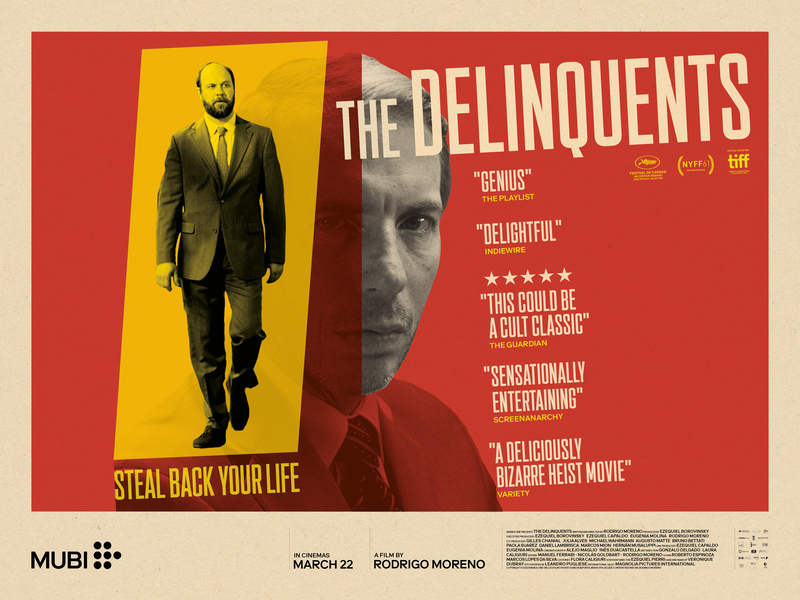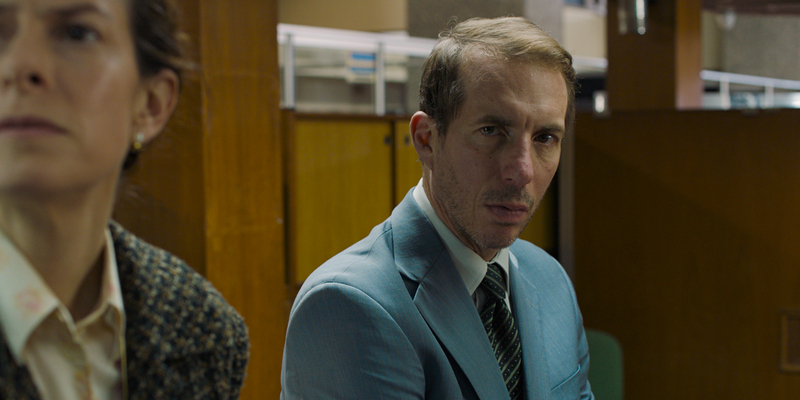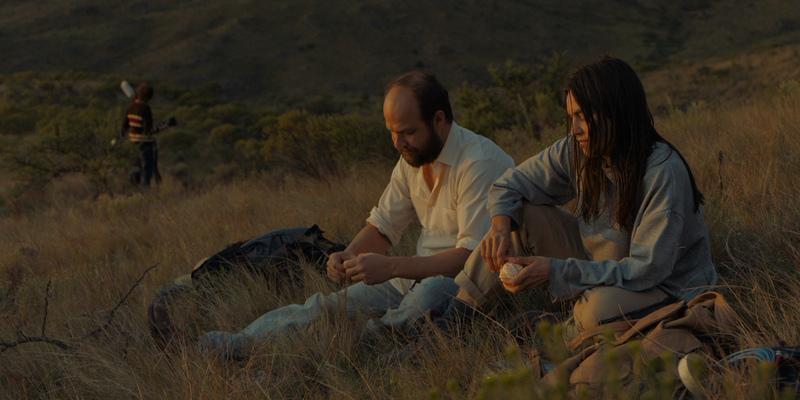
Review by
Eric Hillis
Directed by: Rodrigo Moreno
Starring: Daniel Elías, Esteban Bigliardi, Margarita Molfino, Germán De Silva

There's a scene in writer/director Rodrigo Moreno's
The Delinquents in which an aging convict speaks about the
one thing prison offers that the outside world doesn't – time. On the
outside there's always something taking up your precious time, while
behind bars every day offers empty slots. There's a delicious irony in
this sentiment being expressed in a movie with a three hour plus run
time. Relatively few people will watch The Delinquents. For a start, most people outside Argentina won't know of its
existence. Then there's the huge swathe of viewers who refuse to watch
subtitled movies. But for even for the most curious of cinephiles, that
run time will prove a turn off.
If there's a message in Moreno's film, it's that you have more time
than you think. We convince ourselves that we don't have time to enjoy
life, but this negative persuasion prevents us from making time. A three
hour movie may seem intimidating, but how often do you watch three hour
long TV episodes back to back? How much time do you spend scrolling on
your phone rather than reading a book? How often do you find yourself
spending an hour lying in bed frowning and staring at the ceiling
because you woke up too early, rather than taking advantage and getting
a head start on the day? Of course, much of our time is wasted because
it's out of our hands. We spend hours stood on busses and trains because
our employers don't trust us to work from home. We spend even more hours
pretending to work at the office so we don't get fired.

For Morán (Daniel Elias), time is precious. He's 25 years away
from retirement and goes through the motions at his job at a Buenos
Aires bank. When fate leaves him alone in a vault filled with cash,
Morán decides to change his life, filling a rucksack with hundreds of
thousands of dollars and walking out the door. As it's Friday on a bank
holiday weekend, his crime won't be discovered until the following
Tuesday.
Rather than simply absconding, Morán has a unique plan. He'll hide the
money and then turn himself in without revealing its whereabouts. He
figures with good behaviour he'll be released in three and a half years,
at which point he can retrieve the money and live the life of a retiree.
Morán has convinced himself that three and a half years in prison beats
25 years at the bank.
For some reason I haven't been able to figure out, Morán enlists an
unwilling accomplice in fellow bank employee Román (Estaban Bigliardi). Morán hands over the bag of cash to Román and gives him instructions
to hide it under a rock at the top of a hill in a remote rural area.
Román can keep half of the money but should he ever try to back out,
Morán will tell the authorities he was his accomplice.
Why Morán involves Román is a puzzling question that the film never
answers, but it sets Román off on a journey of self-discovery. Like
Morán, Román is unhappy with his lot. His life consists of working at
the bank and returning to a marriage that seems to be running on fumes.
Heading out to the country to stash the cash, Román gets a taste of the
sort of freedom he didn't know he longed for. He breathes in the clean
country air and wades through a crystal clear stream. When three young
people invite him to join their picnic he makes an excuse to leave,
saying he's in a rush to catch the bus. He's informed that the next bus
doesn't leave for hours. Suddenly Román has something that has too often
eluded him – time.

To say any more would be to ruin the surprising direction the film
takes from that point. What begins as an urban heist thriller evolves
into a pastoral romance, as though the anti-hero of a Jean-Pierre
Melville thriller hopped on a bus and ended up in an Eric Rohmer drama.
It's an echo of thrillers like Nicolas Ray's
On Dangerous Ground and Peter Weir's Witness, in which big city cops discover a life they've been missing out on
when their work brings them to a laid back rural setting, only here it's
a criminal who is subject to such a revelation.
In such films there's always an external force that threatens to
disrupt this newfound idyllic life, but here Román's only enemy is
himself. The authorities never pose a threat to Román, but we fear his
happiness may be threatened by his refusal to bask in his freedom as he
makes excuses to justify his return to the rat race. What's ironic is
that despite the wealth that has fallen in his lap courtesy of Morán's
crime, the contentment Román finds is completely separated from
money.
While Román is breathing in the country air, Morán is similarly
reawakened by the time he has on his hands in prison. He immerses
himself in literature, which he reads from the morning until the last
ray of sun has passed by the bars on his cell window. In a scene that
almost plays like a parody of movies like
The Shawshank Redemption, we watch as Morán reads to a captivated audience of prisoners,
hardened men softened by words they probably can't understand but
certainly feel.

Moreno peppers his film with some absurdist humour. Morán's boss at the
bank and the elderly convict who becomes his nemesis in prison are both
played by the same actor (Germán de Silva). A climactic
confrontation is repeatedly interrupted by a young boy requesting glass
after glass of water. Five of the main characters have names that are
anagrams of one another – Morán, Román, Ramon, Norma, Morna – and at one
point the camera swoops in on a copy of the comic book Namor. Such comic
asides are so sparse in the film's lengthy narrative that they come off
as misplaced, as though Moreno couldn't resist some dad jokes. Moreno
undermines his film with such gags, and if they were removed his film
might even earn favourable comparisons to Antonioni.
The Delinquents is often reminiscent of
The Passenger, the Italian auteur's film in which a man similarly discovers a new
life through another man's actions.
Moreno's film is always captivating to look at, whether it's the
teeming streets of Buenos Aires or the rolling hills of rural Argentina.
He deploys pre-existing pieces by the legendary Argentinian composer
Astor Piazzolla in a manner that makes you believe they were penned to
accompany his film, with Morán's tense theft scored by Piazolla's
'Persecuta' and Román's later rural enlightenment by the Tango titan's
'Suite for Oboe and Strings'. While its sounds and images may be
distinctly Argentinian, The Delinquents' guidance is universal – enjoy yourself, it's earlier than you
think.

The Delinquents is on UK/ROI VOD and MUBI UK now.

